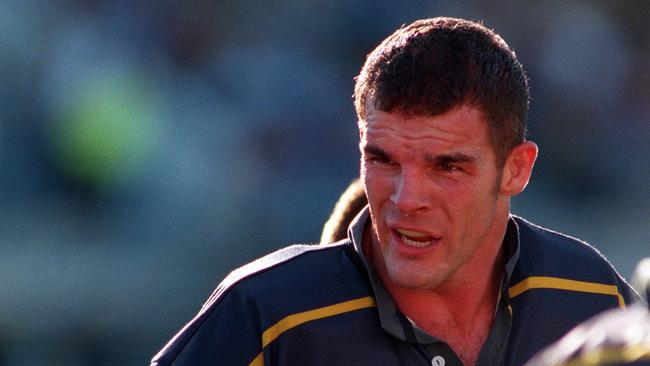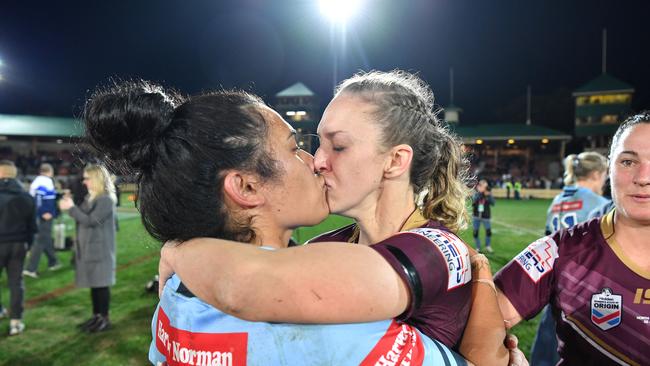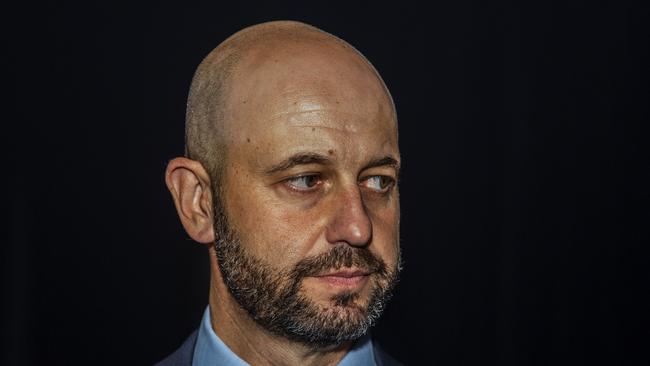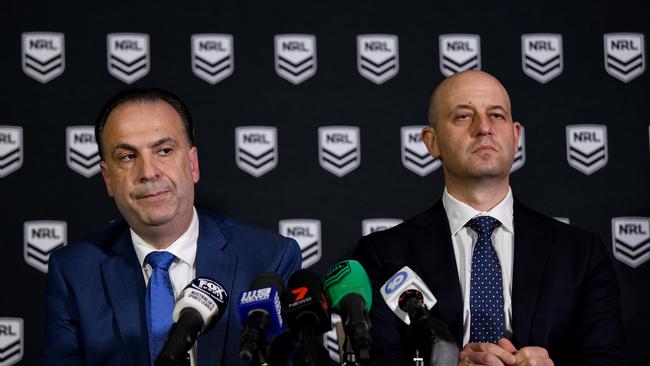The NRL’s quest to appease the politically correct hides issues that could doom rugby league
The NRL tried to hide behind Ian Roberts at their season launch, but their relentless and foolish quest to appease the politically correct only alienates fans and hides wider issues within the game, writes PAUL KENT.
Opinion
Don't miss out on the headlines from Opinion. Followed categories will be added to My News.
LONG RUN: Munster’s chance to join Dally M legends
TIPS.COM.AU: Over $2 million in prizes to be won
He filled the stage and, with a dignity absent this entire week, he returned strength and integrity to a game that is losing its understanding of what these words mean.
With each sentence Ian Roberts delivered at Thursday’s NRL season launch the crowd nodded, very pleased with themselves, that a gay man was speaking before them, and it dawned on few that what he was saying was exactly the opposite of what they were championing all week.
They were cheering against themselves and it was lost on them, such is the confusion nowadays.
For reasons not explained the game has become politically correct, which weakens it because it no longer knows what it stands for. If it sounds OK it must be OK, they seem to think. Words without content.
Roberts spoke of coming out as a gay man in rugby league 25 years ago, and how the response around the game amazed him.
Watch the 2020 NRL Telstra Premiership on KAYO. Every game of every round LIVE & Ad-Break Free during play. New to Kayo? Get your 14-day free trial & start streaming instantly >

“And that was the way that my being gay was embraced and accepted by my teammates, and by the league itself,” he said.
“There were a few nay-sayers _ one coach, and one or two lonely voices in the ARL itself _ but for the most part our NRL community, my community, embraced me.
“It was almost ‘not news’.”
Today, the game make it big news. When Vanessa Foliaki (NSW) kissed her girlfriend Karina Brown (Queensland) after the women’s State of Origin last year the NRL rushed to post the picture on its social media, effectively outing Foliaki.
Her family had no idea she was gay.
Like a steam train, though, the NRL pushed on with its agenda and the kiss was included in the game’s new ad campaign as a show of its “inclusivity” when, as Roberts revealed Thursday, he always felt included.
Roberts told Thursday’ audience about when he left Manly to play for North Queensland in 1997 and Cowboys coach Tim Sheens made him captain.
FOOTY TIPS! Join Australia’s best footy tipping competition for your chance to win big. Add our experts to your league and join now at TIPS.COM.AU.

“Having a gay man as captain made a bit of news in the local papers, but within the club it wasn’t news.
“I was one of the team … one of that footy community.”
And around the room they all nodded, pleased with this new television ad which they proclaim is not a political statement but a statement on inclusivity _ when Roberts showed the playing field was already the greatest leveller of all.
Has anybody running the game ever been close enough to the game to understand this?
It matters because there are bigger concerns beyond messages designed to please the politically correct and the dull of thought.
The NRL announced a $30 million profit last week but, less publicised, was the fact the profit was $6 million down on last year. Also, a $50 million advance on this broadcast will need to be repaid in 2022, the last season of the current broadcast deal, and where the NRL finds the money remained to be seen.
Clubs are financially struggling as their percentage of total NRL revenue drops, partly driven by the NRL’s insistence clubs meet minimum running standards that are proving costly.
The clubs are slowly rising in protest, angry at what they see as excess within headquarters while being subjected to what they believe are unnecessary and costly practices.

The clubs, more than any other reason, puts Greenberg in trouble.
The NRL recently lost Holden as a major sponsor when General Motors closed its operation in Australia and, in a disturbing sign of corporate cannibalism, are now trying to woo the Brisbane Broncos’ major KIA to flip its sponsorship to head office.
Just last week ARL Commission chairman Peter V’landys and NRL chief commercial officer Andrew Abdo returned from a trip to California to begin setting up the negotiation for the next broadcast deal which, as the game’s greatest source of income, will be vital to the game’s future.
And hovering over it all is the growing feud between V’Landys and NRL chief executive Todd Greenberg, whose deadline for a contract extension has come and gone, less than a week before the new season kicks off.
Greenberg has already said he wants the contract finalised before the season begins.
The Commission will meet soon to decide whether Greenberg gets his extension, although it is looking increasingly unlikely.
After all, what is there to lose?
Even if the NRL chooses not to extend Greenberg the terms of the deal means he would remain in charge until his contract ends in October.
The clubs have sensed they have an opportunity, with the extension clause yet to be activated, to work on the Commission to not take up the extension.

The clubs don’t believe the NRL is in touch with its greater audience, that the game is not being led in the right direction, as evidenced by this week’s ad, and are angry at the NRL’s arrogance towards them.
This goes right back to the very start of the Commission when inaugural chairman John Grant gathered a collection of business leaders for the very first Commission and told the clubs their big business brains were about to show the NRL clubs how to make money.
Five years and $1 billion later Grant’s Commission had no money in the bank, got refused a $30 million bank loan, did not own one asset, TV ratings were down, and less people played the game.
Where the billion dollars went was never explained.
Greenberg, as the head of the organisation, is now the club’s target.
The NRL’s decision to focus its new advertising campaign on minority groups, making up less than 10 per cent of Australia’s population, underlined the concern.
At a time when the game is in a financially parlous state, why the decision to focus on minorities?
Advertising campaigns are designed, by their very nature, to attract new customers to a product. Focusing on any group was always going to come with a risk.
The complaint here, and it is important to understand the difference, is not that the game’s politics do or do not agree with mine but that the game should not be playing politics at all.
The NRL must be apolitical, thus making everybody feel welcome. It must be above politics
Nowadays we have human resources departments that peering over everything we do and say; Big Brother, right where we work.
Sport was always the oasis. The fresh air where fans could breathe and escape politics. Where what mattered was performance on the field.
This current NRL, trying to make friends, has missed that point, one the game always stood for.
This week’s failed message within the new ad campaign - like a joke, if you have to explain it then it hasn’t worked - has lifted the stakes in the battle between V’Landys and Greenberg.
It is almost certain only one will survive.

